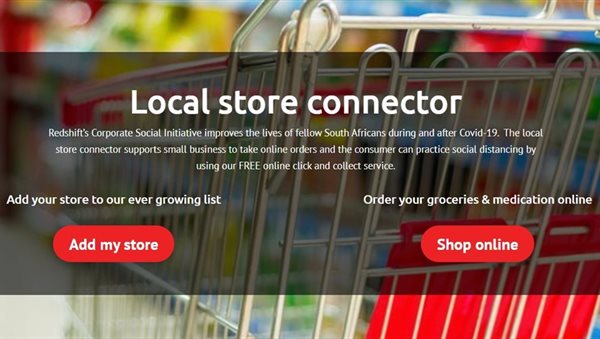The new free tool is a standalone CSI initiative from Redshift, and makes use of the local startup's website builder.
The online platform functions in two ways:
1. It lets retail micro, small and medium enterprises (MSMEs) register their stores in order to access the local market at no cost; and
2. It allows customers to shop from their local stores by simply submitting their grocery list and collecting the goods after receiving confirmation, again at no cost. Thus, avoiding long queues and the risk of getting infected and spreading the virus, while enabling food security for households.
Assisting informal, independent and micro retailers
The platform is the brainchild of Redshift founders Mmabatho Mokiti, John McDonald and Douglas Hoseck, who wanted to provide small businesses, especially those in the townships and of an informal nature, the opportunity to list themselves and accept orders from shoppers.
Redshift, with the support of FinMark Trust, will focus on connecting retailers to their customer base using digital means. Orders for essentials can be pre-packed and prepared by the business for collection by the customer or for home delivery. As part of the on-boarding process, the platform will facilitate the formal registering of MSMEs as essential services, which will allow them to continue to trade during the lockdown.
Subsequent developments will include the introduction of digital payments and digital generation of management accounts that will assist in securing funding for working capital and expansion.
Digitalising the township economy
According to a recent report by the International Finance Corporation which measured the size of South Africa’s small business sector, only 14% of South Africa’s estimated 5.78 million MSMEs are formalised. Of the 817,000 formal MSMEs, 686,000 are classed as small, very small and micro. In contrast, over 2 million informal MSMEs and 2,89 million survivalist businesses exist. Most of these micro-businesses exist to create self-employment.
Retail accounts for the majority of MSMEs with most MSMEs operating in domestic trade (wholesale and retail). Redshift says the current lockdown has benefitted large food retailers and established chain stores, but has dealt a blow to small independent retailers in township environments.
While the lockdown regulations allow food retailers to continue trading, they must formally apply for a licence to do so. According to Redshift, there is "a lack of clarity as to whether independent retailers such as spaza shops are allowed to trade from their premises and social distancing protocols have discouraged shoppers from utilising their services". This has resulted in many shoppers flocking to large chain stores.
Richard Wells 21 Apr 2020 Solving several problems at once
“We decided to do something to help South Africa during her time of need. Given Redshift is an agile, easy to use website builder with phenomenal turnaround times, we built our Local Store Connector in a matter of hours with a solution-orientated mentality in mind. Here’s the perfect tool to help connect consumers to small business owners while solving several problems at once.
"Social distancing, food security, safety and convenience are some of the immediate benefits that a customer will gain from using the local store connector. The benefits for small business owners include getting a free online presence to help make an already under pressure customer base aware that they are open for trade during lockdown as well as facilitating customer orders,” says McDonald.







































